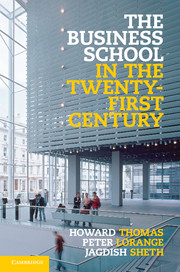Crossref Citations
This Book has been
cited by the following publications. This list is generated based on data provided by Crossref.
Thomas, Howard
Harney, Stefano
and
Thomas, Howard
2013.
Towards a liberal management education.
Journal of Management Development,
Vol. 32,
Issue. 5,
p.
508.
Clarke, Thomas
and
Lorange, Peter
2013.
Business school culture: customer‐focused, virtual and cooperative.
Education + Training,
Vol. 55,
Issue. 4/5,
p.
336.
Thomas and Eric Cornuel, Howard
Thorpe, Richard
and
Rawlinson, Richard
2014.
Engaging with engagement: how UK business schools could meet the innovation challenge.
Journal of Management Development,
Vol. 33,
Issue. 5,
p.
470.
Thomas and Eric Cornuel, Howard
and
Canals, Jordi
2014.
Global leadership development, strategic alignment and CEOs commitment.
Journal of Management Development,
Vol. 33,
Issue. 5,
p.
487.
Thomas and Eric Cornuel, Howard
Thomas, Howard
Lee, Michelle
and
Wilson, Alexander
2014.
Future scenarios for management education.
Journal of Management Development,
Vol. 33,
Issue. 5,
p.
503.
Windsor, Duane
2016.
Economic Rationality and a Moral Science of Business Ethics.
Philosophy of Management,
Vol. 15,
Issue. 2,
p.
135.
Hommel, Ulrich
Li, Wenwei
and
Pastwa, Anna M.
2016.
The state of risk management in business schools.
Journal of Management Development,
Vol. 35,
Issue. 5,
p.
606.
Layton, Roger A.
2016.
The Accidental Scholar, by Jagdish N. Sheth with John Yow, Sage Publications, 2014.
Journal of Business-to-Business Marketing,
Vol. 23,
Issue. 1,
p.
81.
2016.
Reimagining Business Education.
p.
125.
Thomas and Eric Cornuel, Howard
and
Davies, Julie
2016.
Are business school deans doomed? The global financial crisis, Brexit and all that.
Journal of Management Development,
Vol. 35,
Issue. 7,
p.
901.
Thomas and Eric Cornuel, Howard
Kalika, Michel
Shenton, Gordon
and
Dubois, Pierre-Louis
2016.
What happens if a business school disappears? The intellectual foundations of BSIS.
Journal of Management Development,
Vol. 35,
Issue. 7,
p.
878.
Thomas and Eric Cornuel, Howard
Lorange, Peter
and
Thomas, Howard
2016.
Pedagogical advances in business models at business schools – in the age of networks.
Journal of Management Development,
Vol. 35,
Issue. 7,
p.
889.
Spender, J.-C.
2016.
Multi-Level Governance in Universities.
Vol. 47,
Issue. ,
p.
141.
Ghobadian, Abby
2017.
The Future of Management Education.
p.
205.
2017.
Africa.
p.
1.
Rive, Jérôme
Bonnet, Marc
Parmentier, Catherine
Pelazzo-Plat, Valérie
and
Pignet-Fall, Lorella
2017.
Vers une responsabilité sociétale intégrée dans la stratégie des écoles de management: Projet de recherche-action avec un réseau d’écoles.
Recherches en Sciences de Gestion,
Vol. N° 116,
Issue. 5,
p.
127.
Kessler, Eric H.
2017.
The Triumphant Triumvirate: Synergistically Realizing the Purposes of a University Through a Core Management Course.
Journal of Management Education,
Vol. 41,
Issue. 6,
p.
794.
2017.
Africa.
p.
169.
Lee, Michelle P.
Thomas, Howard
Thomas, Lynne
and
Wilson, Alexander
2018.
Blind Spots in African Management Education: An Examination of Issues Deserving Greater Attention.
Africa Journal of Management,
Vol. 4,
Issue. 2,
p.
158.
2018.
Rethinking the Business Models of Business Schools.
p.
9.





